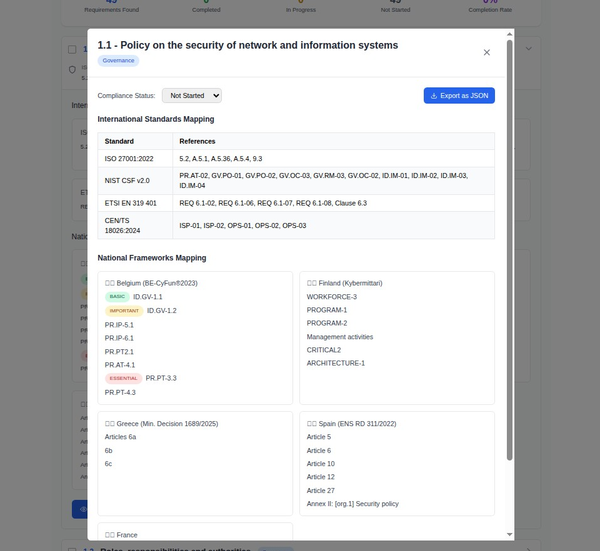Additional Comprehensive AI Regulatory Frameworks in 2024

Introduction
Beyond the EU AI Act and the US AI Bill of Rights, several other comprehensive regulatory frameworks have been developed worldwide to govern the ethical and responsible use of AI. These initiatives aim to address the diverse challenges posed by AI technologies, ensuring that they are deployed in ways that are transparent, accountable, and beneficial to society. This section explores additional regulatory frameworks that have been established or significantly advanced in 2024.

Additional Comprehensive AI Regulatory Frameworks
1. Canada's Directive on Automated Decision-Making
- Overview: Canada has implemented the Directive on Automated Decision-Making, which sets out guidelines for the responsible use of AI in federal government services.
- Key Features:
- Algorithmic Impact Assessment (AIA): Requires government agencies to conduct AIAs to evaluate the potential impacts of automated decision-making systems.
- Transparency and Accountability: Mandates the disclosure of how AI systems are used in decision-making processes and establishes mechanisms for accountability.
- Human Oversight: Ensures that critical decisions are subject to human review, particularly those that significantly affect individuals' rights or interests.
2. Japan's AI Governance Guidelines
- Overview: Japan has developed comprehensive AI governance guidelines to promote the ethical development and use of AI technologies across various sectors.
- Key Features:
- Ethical AI Development: Encourages the integration of ethical considerations into the design and development of AI systems.
- Public Trust: Aims to build public trust in AI by ensuring that AI technologies are transparent, reliable, and safe.
- International Collaboration: Promotes international collaboration on AI governance to address global challenges and standards.
3. China's AI Regulations and Standards
- Overview: China has established a set of regulations and standards to govern AI development, focusing on ensuring security, promoting innovation, and protecting public interests.
- Key Features:
- Security and Safety: Emphasizes the importance of AI system security and safety to prevent misuse and potential harms.
- Innovation Support: Provides guidelines that balance regulation with support for AI innovation and development.
- Ethical Guidelines: Sets out ethical guidelines for AI development, including respect for privacy, fairness, and transparency.
4. India's National AI Framework
- Overview: India has introduced a National AI Framework aimed at guiding the ethical and responsible deployment of AI technologies across the country.
- Key Features:
- Inclusive AI Development: Ensures that AI technologies are developed in a way that is inclusive and benefits all segments of society.
- Regulatory Sandboxes: Establishes regulatory sandboxes to test and refine AI innovations under regulatory oversight.
- Data Protection: Integrates robust data protection measures to safeguard personal data used in AI systems.
5. South Korea's AI Ethics Charter
- Overview: South Korea has developed the AI Ethics Charter to guide the ethical use and development of AI technologies.
- Key Features:
- Human-Centric AI: Promotes AI development that prioritizes human well-being and societal benefits.
- Transparency and Accountability: Ensures that AI systems are transparent and that there are mechanisms for accountability.
- Collaborative Governance: Encourages collaboration between the government, industry, and civil society in AI governance.
6. Singapore's Model AI Governance Framework
- Overview: Singapore has implemented the Model AI Governance Framework to provide practical guidelines for organizations deploying AI technologies.
- Key Features:
- Risk Management: Provides a risk management framework for assessing and mitigating risks associated with AI deployment.
- Accountability Framework: Establishes clear accountability structures for AI system governance and decision-making.
- Public Consultation: Encourages public consultation and stakeholder engagement in the development of AI policies and guidelines.
7. Australia’s AI Ethics Framework
- Overview: Australia has developed an AI Ethics Framework to ensure that AI technologies are used in ways that are fair, accountable, and respect human rights.
- Key Features:
- Principles-Based Approach: Sets out key principles such as fairness, transparency, and accountability to guide AI development and use.
- Ethical AI Certification: Introduces a certification scheme for ethical AI systems, ensuring compliance with established principles.
- AI Impact Assessments: Requires organizations to conduct AI impact assessments to identify and address potential ethical and social impacts.
8. Brazil’s AI Legal Framework
- Overview: Brazil has enacted a legal framework for AI that includes comprehensive regulations to govern the use of AI technologies.
- Key Features:
- Legal Certainty: Provides clear legal standards and definitions for AI technologies and their use.
- Ethical Considerations: Ensures that AI development and deployment adhere to ethical standards, including respect for human dignity and rights.
- Consumer Protection: Strengthens consumer protection mechanisms to address the risks associated with AI applications.


Conclusion
In 2024, the global regulatory landscape for AI continues to expand with various countries and regions developing comprehensive frameworks to govern the ethical and responsible use of AI technologies. These initiatives are designed to ensure transparency, accountability, and public trust in AI, while also fostering innovation and international collaboration. By staying informed about these regulatory developments, businesses and organizations can align their AI practices with global standards and contribute to the ethical evolution of AI technologies.






